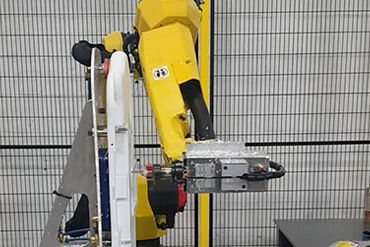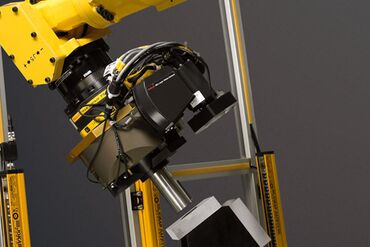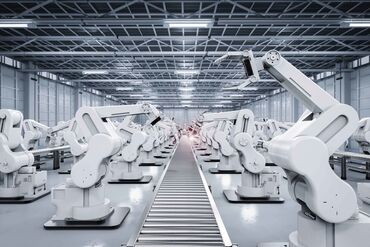Aluminum Welding Automation
Nov 1, 2017
Aluminum is one of the most difficult alloys to weld, melting at a much higher temperature. Therefore, it is important to properly clean the aluminum oxide surface before welding. Contact Robots.com experts today for the perfect robotic solution for your aluminum welding automation system.
Aluminum is the most difficult alloy to weld. Aluminum oxide melts at 3700oF, compared to aluminum which melts at 1200oF. Because of this, aluminum oxide should be thoroughly cleaned from the surface before welding. Aluminum comes in heat-treatable and non-heat treatable alloys. Heat treatable aluminum alloys get their strength through a process called aging. Significant decrease in tensile strength can occur when welding aluminum due to over-aging.
9 Groups of Major Aluminum Alloying Elements:
| Designation | Major Alloying Element |
| 1xxx | Unalloyed (pure) >99% Al |
| 2xxx | Copper is the principal alloying element, though other elements (Magnesium) may be specified |
| 3xxx | Manganese is the principal alloying element |
| 4xxx | Silicon is the principal alloying element |
| 5xxx | Magnesium is the principal alloying element |
| 6xxx | Magnesium and Silicon are principal alloying elements |
| 7xxx | Zinc is the principal alloying element, but other elements such as Copper, Magnesium, Chromium, and Zirconium may be specified |
| 8xxx | Other elements (including Tin and some Lithium compositions) |
| 9xxx | Reserved for future use |
Factors Affecting the Aluminum Welding:
- Aluminum Oxide Coating
- Thermal Conductivity
- Thermal Expansion Coefficient
- Melting Characteristics
Wrought Aluminum Alloys
1xxx Series
These grades of aluminum are characterized by excellent corrosion resistance, high thermal and electrical conductivities, low mechanical properties, and excellent workability.
Moderate increases in strength may be obtained by strain hardening. The major impurities are iron and silicon.
2xxx Series
These alloys require solution heat treatment to obtain optimum properties; in the solution heat-treated condition, mechanical properties are similar to, and sometimes exceed, those of low-carbon steel.
In some instances, precipitation heat treatment (aging) is employed to further increase mechanical properties. This treatment increases yield strength, with attendant loss in elongation; its effect on tensile strength is not as great.
The alloys in the 2xxx series do not have as good corrosion resistance as most other aluminum alloys, and under certain conditions they may be subject to intergranular corrosion.
Alloys in the 2xxx series are good when some strength at moderate temperatures is desired. These alloys have limited weldability, but some alloys in this series have superior machinability.
3xxx Series
These alloys generally are non-heat treatable but have about 20% more strength than 1xxx series alloys.
Because only a limited percentage of manganese (up to about 1.5%) can be effectively added to aluminum, manganese is used as a major element in only a few alloys.
4xxx Series
The major alloying element in 4xxx series alloys is silicon, which can be added in sufficient quantities (up to 12%) to cause substantial lowering of the melting range.
For this reason, aluminum-silicon alloys are used in welding wire and as brazing alloys for joining aluminum, where a lower melting range than that of the base metal is required.
The alloys containing appreciable amounts of silicon become dark gray to charcoal when anodic oxide finishes are applied and hence are in demand for architectural applications.
5xxx Series
The major alloying element is Magnesium and when it is used as a major alloying element or with manganese, the result is a moderate-to-high-strength work-hardenable alloy.
Magnesium is considerably more effective than manganese as a hardener, about 0.8% Mg being equal to 1.25% Mn, and it can be added in considerably higher quantities.
Alloys in this series possess relatively good welding characteristics and relatively good resistance to corrosion in marine atmospheres.
However, limitations should be placed on the amount of cold work and the operating temperatures permissible for the higher-magnesium alloys to avoid susceptibility to stress-corrosion cracking.
6xxx Series
Alloys in the 6xxx series contain silicon and magnesium approximately in the proportions required for formation of magnesium silicide (Mg2Si), thus making them heat-treatable.
Although not as strong as most 2xxx and 7xxx alloys, 6xxx series alloys have relatively good formability, weldability, machinability, and relatively good corrosion resistance, with medium strength.
Alloys in this heat-treatable group are sometimes formed in the T4 temper (solution heat treated but not precipitation heat treated) and strengthened after forming to full T6 properties by precipitation heat treatment.
7xxx Series
Zinc, in amounts of 1 to 8% is the major alloying element in 7xxx series alloys, and when coupled with a smaller percentage of magnesium results in heat-treatable alloys of moderate to high strength.
Usually other elements, such as copper and chromium, are also added in small quantities.
Some 7xxx series alloys have been used in airframe structures, and other highly stressed parts.
Higher strength 7xxx alloys exhibit reduced resistance to stress corrosion cracking and are often utilized in an overaged temper to provide better combinations of strength, corrosion resistance, and fracture toughness.
Robots.com carries a large variety of welding robots with different work envelopes, footprints, mounting options and speeds. Please contact us today if you would like a quote on any of our welding robots or to discuss your needs and requirements. You can also call us at 877−762−6881.
Related Articles
You might be also interested in:

- Featured
Latest Advancements in Material Cutting Robotics
Read about the latest technological advancements in robotic material cutting.

- Featured
Emerging 3D Vision Technologies for Industrial Robots
Learn about the emerging 3D vision technology that businesses are using for industrial robot applications.

- Featured
Most Popular Industrial Robotic Applications for 2021 and Projections
Explore the most popular application trends of 2021 and what to expect in the future.
Let's talk!
Request your quick quote today.

